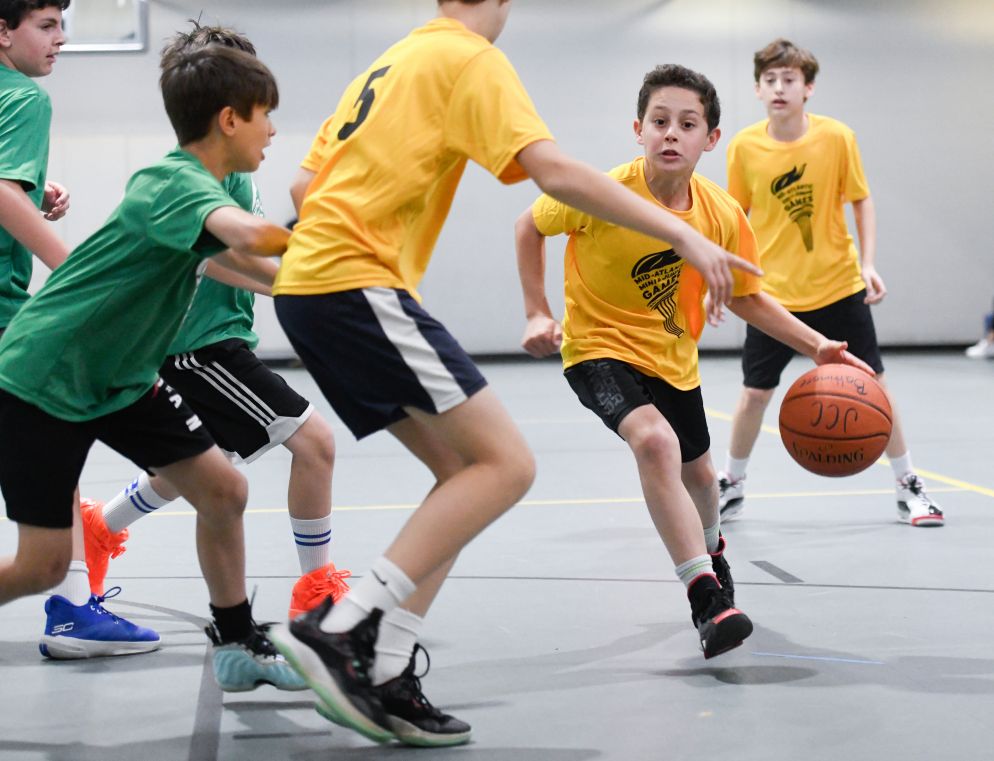
It was a big day for the JCC of Greater Baltimore as over 500 children from 12 different JCC branches from across the mid-Atlantic region came to compete in the 2023 Mini & Jr. Maccabi Games.
On Sunday, May 7, the JCC of Greater Baltimore hosted the annual sports competition. The opening ceremony took place on the Rosenbloom Owings Mills JCC campus, while various sporting events were spread out across different locations in the nearby area. The Mini Maccabi Games are aimed at athletes aged 9-10, and the Jr. Maccabi Games are for athletes aged 11-12.
The JCC of Greater Baltimore team took home gold medals in Mini and Jr. Boys Soccer, Jr. Girls Soccer and Jr. Boys Baseball, competing against other JCC chapters from Philadelphia; Washington, D.C.; South Jersey; Great Neck, N.Y.; and more.
This is the JCC of Greater Baltimore’s third time hosting the games, having previously held them at the Owings Mills JCC in 2014 and 2018. They’ve also hosted the JCC Maccabi Games, aimed at teenagers aged 13-16, a total of five times from 1992 to 2010.
The duty of hosting the Mini and Jr. games operates on a four-year cycle, and Baltimore was supposed to host the games in 2022. But the COVID-19 pandemic, while starting to wind down at the time, led them to push the event back one year.
“You really need the proper infrastructure to be able to pull [hosting the Mini & Jr. Maccabi Games] off,” said Paul Lurie, chief operating officer of the JCC of Greater Baltimore. Lurie has been heavily involved with organizing the games, in part because of his history working in the fitness and wellness industry. “Having the proper facilities and staffing is important.”
The Mini & Jr. Maccabi Games have a lot of moving parts, with multiple sporting events occurring at the same time in different locations. It can be a tricky balancing act to have everyone in the right place at the right time, so the organizers need to coordinate.
“It’s definitely a partnership where we give each committee ownership to recruit the volunteers they need,” Lurie explained. “Then we have to plan everything and make sure everyone is on the same page, so it’s something we can all accomplish.”
Close to 200 volunteers, parents and other community members signed up to ensure the games ran smoothly. Their duties included keeping score at games, handing out lunches and serving as medical staff in case of any injuries.
The games’ opening ceremony saw speeches from community figures involved with the games such as Barak Hermann, the CEO of the JCC of Greater Baltimore; Rebecca Chinsky, the JCC of Greater Baltimore’s senior director of aquatics and recreation and Maccabi Games director; and Baltimore County Councilman Israel “Izzy” Patoka, whose son participated in the games in the past.
“Maccabi is part of being Jewish and part of representing your community,” Patoka said, addressing the young athletes. “You and your family will remember this for the rest of your entire life.”
This year’s games also featured a charity element: the JCC of Greater Baltimore partnered with Keeping Baltimore Warm to hold a blanket drive during the event. The nonprofit organization, founded by local Jewish teenagers Grace Miller and Isaac Garonzik, distributes blankets to homeless shelters in Baltimore. Prior to the event, the JCC requested that participants bring new twin-sized blankets for donation.
“We always like to do a service project for all the teams coming here, so we can use our platform to help improve the world,” Lurie said. “We were excited to collect as many blankets as we could from 500 kids from up and down the East Coast, to be able to donate and support families in need.”
The games themselves are fairly secular, but are built upon six core Jewish values as a foundation: life, peace, justice, mercy, scholarship and sincerity. They also offer a space for young Jewish athletes to compete and connect with others like them and to form a better sense of community. In addition, the games honor those who came before — all participants in this year’s games wore black wristbands to honor the Munich Eleven, the Israeli athletes who were victims of the hostage crisis during the 1972 Munich Olympics.
“Win or lose,” Chinsky said in a speech at the games’ opening ceremony, “we want you to always remember these Jewish values.”







